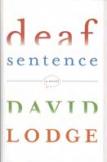Sound of Silence
David Lodge’s earlier books won him a reputation as one of the leading comic novelists of the past century. Small World and Nice Work, both send-ups of the academic world, were finalists for the Booker Prize. What makes several of his novels especially hilarious to America readers is his use of Catholic central characters whose ridiculous actions parody the life situation of a younger Lodge. The British Museum Is Falling Down, for example, presents a day in the life of a married Catholic graduate student working on his dissertation.
When Adam gets to the library, he is so worried that his wife may again be pregnant that he gets nothing done. (They already have three small children, and have not mastered the rhythm method.) Unfortunately, this wonderful Catholic farce—perhaps somewhat dated today—failed to reach the audience it deserved when published in the United States in 1967, perhaps since most churchgoers were too upset by the church’s condemnation of birth control, renewed in Humanae Vitae (1968). Two later novels, How Far Can You Go? (1980) and Paradise News (1991), successfully draw on the confusion of Catholics in the aftermath of the Second Vatican Council.
Lodge’s new book, Deaf Sentence, is set in Rummidge, a stand-in for Birmingham; and its hero, Desmond Bates, a linguistics professor like the author himself, has taken early retirement because of a severe hearing loss. The humor is mostly restrained, starting with Bates’s difficulty in following simple exchanges with his wife, Fred (short for Winifred). Desmond is presented as an agnostic who had a nominal Anglican upbringing; Fred has returned to Catholic practice and launched a successful interior-design business. At an evening party Bates meets Alex Loom, a shapely graduate student from America, who flirts with him in the hope that he will mentor her doctoral thesis. Unable to make out what she is saying in the crowd noise but finding her quite attractive, he is maneuvered into seeing her again at her apartment—but fails to tell his wife about it.
Reminding himself that deafness is comic, while blindness is tragic, Bates starts a journal to keep his life somewhat in order. Alex has revived the sexual desire of late middle age; besides, he enjoys the prospect of helping this young woman make a close study of suicide letters, while drawing on his own specialization in linguistics and discourse. But Lodge is less successful in drawing humor from the Bates-Alex relationship than from sexual intrigues in earlier novels, primarily because readers remain uncertain as to whether they should see the young woman as an opportunist or a victim of her American past.
Bates spends much of his time going to London to see his father, a man who had worked for years as a jazz musician, now nearly 90 and degenerating but stubbornly refusing help. The frustrating relationship between father and son, though treated with sympathy, constantly reveals comic aspects. Messages from Alex bring further confusion, arriving at the same time as e-mail ads for Viagra; he is even driven to write a suicide note he has no intention of acting on.
Events pile up, with varying degrees of emotional impact on Bates. A daughter produces a grandchild; he recalls the grim reality of his first wife’s death; there is a threatening note from Alex; he helps his father through the old man’s final moments. Lodge somehow manages to bring these disparate threads of his story together with credibility and humanity. Deaf Sentence is not the author’s funniest book, but readers should appreciate its mellow wit, close observation of language and compassionate understanding of aging and suicide.
This article also appeared in print, under the headline “Sound of Silence,” in the January 19, 2009, issue.









